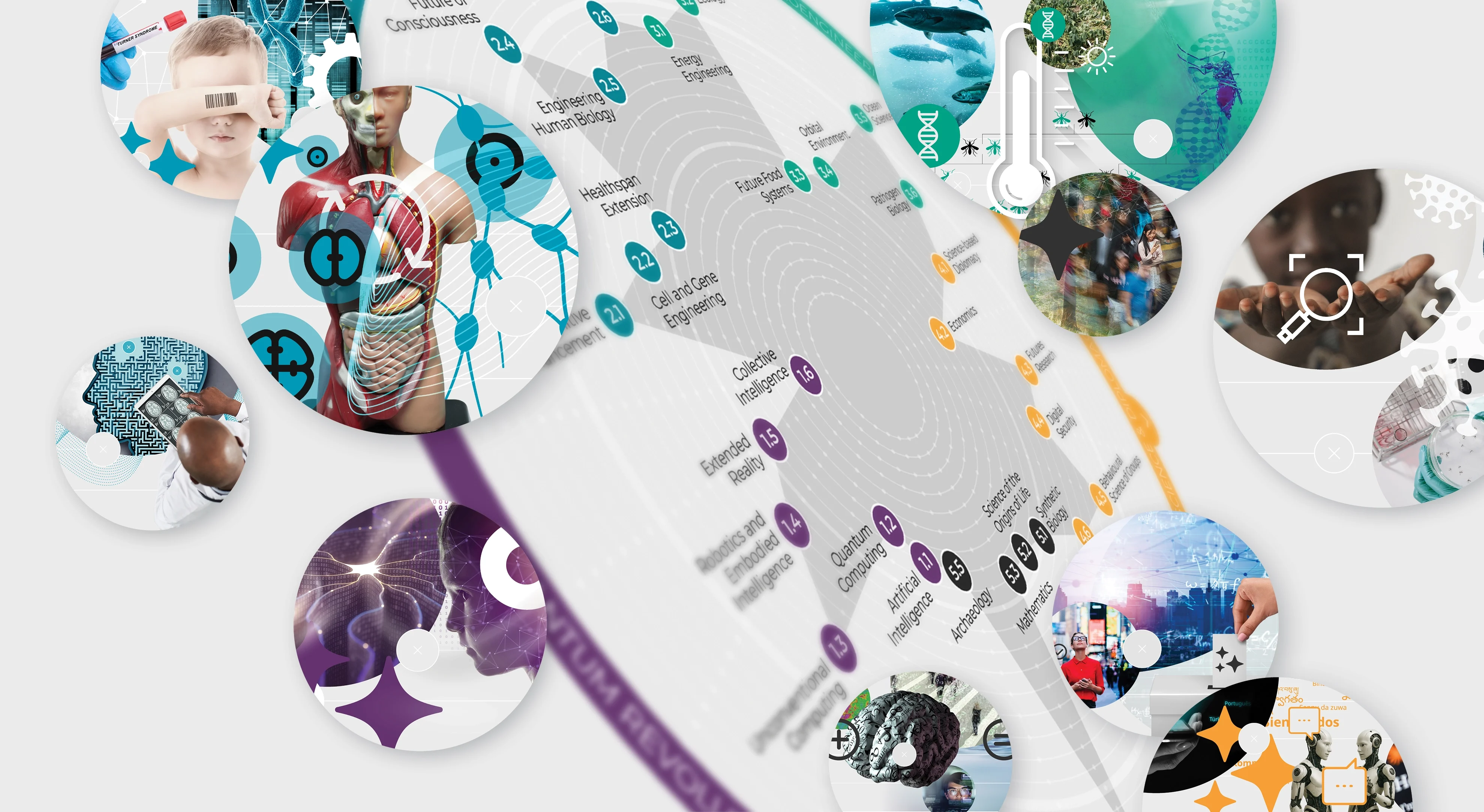This year, we include scientists’ anticipatory perspectives on a number of new topics, including Ecology, Language and Communication, Mathematics, and Fungal Biology. We also offer expanded deep dives into key priority areas, including:
- An in-depth report on Planetarised Humanity, resulting from the third GESDA High-Level Anticipation Workshop. This meeting, held in spring 2024, brought together researchers from 15 disciplines to discuss novel scenarios and anticipate trends arising from proliferating global connectivity, rapid changes in environmental contexts and human circumstances, and accelerating technological innovation.
- A spotlight on anticipated breakthroughs at the interface of sleep and longevity research. This report is just one of the outputs of a high-level meeting convened in Singapore in March by GESDA, the ETH Singapore Centre and the National University of Singapore.
- The three GESDA Lenses on Science, Philosophy and Geopolitics.
The Science Lens offers a unique insight into the future of research in science and technology. The landscape for this activity is changing rapidly as national priorities shift the context in which science operates. Research ecosystems are increasingly vulnerable to change, with scientists ill-equipped for working in the transdisciplinary collaborations that are becoming a necessary part of addressing complex global challenges. New, robust and resilient ecosystems must be created if the practice of science and technology research is to take the strategic opportunities for transformation that could make it a vibrant tool that serves diverse global communities and makes scientific benefits accessible to all.
The Philosophy Lens summarises the exploration by leading philosophers at GESDA’s third Anticipation Workshop of issues arising from the complex phenomenon of Planetarised Humanity. Current and anticipated trends in science and technology will inevitably transform what it means to be human, how we can live together as societies and how we can sustain our planet for all life forms. Since humans are fundamentally linguistic creatures, subtle changes in our words and concepts will significantly influence how we define ourselves as we build our future world. Building peaceful societies will depend on maintaining shared language to foster positive co-existence between humans, non-human intelligences and the natural environment on a global scale. Moving beyond technical fixes to rethink core ideas underlying our Planetarised Humanity condition — about progress, nature and well-being — may offer the most fruitful path forward for developing inclusive, global solutions to ensure a sustainable future.
The Geopolitics Lens provides an in-depth analysis of the future of scientific research in a geopolitical context. Now a core currency in international affairs, science and technology are both shaping and shaped by geopolitics. There is power in being able to shape, control and deploy global research agendas, and expertise has become a strategic asset. What’s more, there are many more areas of strategic interest than ever before, including fields such as AI, biotechnology and space. This report highlights the challenges this situation creates for science and technology research, and — maybe most importantly — for its governance.
Highlights of the 2025 GESDA Science Breakthrough Radar
Artificial Intelligence
Breakthroughs in AI over the past five years have been particularly revolutionary for business and education, but it currently dominates global discourse in almost every area of human endeavour, from science to art and from economics to philosophy. Given the unprecedented pace and erratic course of change, it is extraordinarily difficult to know what’s coming next, save to say that it is unlikely to be a smooth continuation of current trajectories. The problem of prediction is compounded by the growing consensus that new approaches to building AI systems will be required to significantly improve performance and achieve adaptable, efficient and trustworthy AI platforms that can be deployed broadly across society.
Research continues to explore how, for example, the biology of the brain could provide inspiration for more data-efficient learning approaches. Conversely, AI could provide us with new approaches to scientific discovery. However, the application of AI to science requires careful consideration, supervision and validation: in particular, it requires rich data to function and can end up wasting resources by going down avenues that human scientists would instinctively identify as dead ends. It can also readily come up with plausible explanations for phenomena that turn out to have no basis in reality. These are artefacts of the way today’s AI works: they find and exploit correlations within datasets but have no “common sense” appreciation of causal relationships. Building AI that has a concept of the world within which it exists (that is, a “world model”) could significantly improve its capabilities, as could endowing it with an understanding of causality.
However, even without such a radical overhaul, there is already enough latent power in our AI systems to cause significant further disruption to many of society’s systems and infrastructures, and it is vital that researchers, businesses, regulators and policy-makers work together to ensure that the benefits of AI reach as wide a swathe of humanity as possible — while limiting its negative impacts. AI is already outperforming humans in a widening range of tasks.
Cognitive Enhancement
The workings of the human brain present one of the greatest mysteries in the entire cosmos. But after millennia of “blunt instrument” approaches to investigating the brain — relatively crude surgical or pharmaceutical interventions — we are in a time of radical innovation which should help to shed light on how our minds work. We can use silicon-based technologies, photons of light or chemical stimuli to stimulate neural activity, alter brain states and achieve therapeutic effects — some of which are truly life-changing.
For researchers in the field, these and other developments promise rapid advances in our understanding of the processes underlying thought, memory and action. For example, AI can be used to analyse huge datasets of neural signals, turn brain activity into images and speech, and thus provide insights into the fundamental mechanisms of cognition. Future developments could lead to insights about how neurons — more specifically, networks of neurons, since cognitive processes appear to be dynamic and distributed — encode information and how their signals instigate or affect thought, impulse, action and mood. Brain-computer interfaces are available in many forms. Some allow artificial systems to read and write brain signals, opening up the possibility of learning to interpret and synthesise brain signals.
That means these technologies have profound real-world applications, too. Read-outs from deep-brain implants can already turn an unexpressed intention or desire to move a limb into a digital command that can initiate the action. The implication for those with paralysis or other neural restrictions is clear: technology is making it possible to bypass irreparably damaged neurological systems. Equally exciting is the potential to perform “exogenous cognition”, where mental tasks are offloaded to external processors. This is already happening to a limited extent, but future developments could significantly augment our memories, decision-making and learning.
Engineering Human Biology
As synthetic human genomes, miniature human organs grown in a lab and replicas of human embryos have started to become part of today’s reality, we can look forward to the considerable benefits for human health and well-being that our vast and multifaceted ability to re-engineer human biology promises. Cancer, cardiovascular disease, fertility roadblocks and immune-system disorders are just some of the possible targets of this research. Emerging technologies such as AI, tissue engineering and genome editing are converging to make a tangible difference to the way we manage human biology.
Reprogramming cells and tissues, for example, promises a means of reversing age-related loss of function, of making cancer cells a target for the immune system and even of growing new tissues and organs to order. The thriving field of “organoids” — lab-grown mini-organs — is heading towards growing replica kidneys or bone marrow for transplant. There are even “mini-brains”, grown in culture, that promise to help elucidate the pathways associated with dementia.
All these developments, however, cast ethical, legal and regulatory shadows over our current governance frameworks, and it will be essential that they are properly accompanied by the fields of philosophy and ethics in parallel to legislative developments. A quarter of a century ago, researchers began liaising with policy-makers, regulators and the media to prepare the ground for babies who would have three “parents”, one being a donor who would ensure the child was born free of lethal mitochondrial diseases. Those babies were finally born this year through the research conducted by scientists contributing to the GESDA Radar. Now a similar effort must begin for the many transformative advances in engineering human biology that will come over the next quarter of a century.
Ecology
There can hardly be a more pressing issue facing humanity than our ecological challenges. Shifts in climate are resulting in changes to all Earth’s ecosystems and even the creation of new ones, as populations of various species are forced to share habitats in unprecedented ways. Such scenarios only increase the likelihood of new human pandemics, caused by mutations in animal-borne viruses and other pathogens. This is made even more likely by the fact that humans are themselves introducing new species to regions where they did not previously exist, whether accidentally or purposefully. As a consequence, ecologists are seeing many groups of organisms undergoing rapid evolution in response to human activity.
However, researchers are also pioneering a slew of exciting innovations that have the potential to greatly improve our understanding of ecology. New genetic-analysis tools, cutting-edge chemical sensors, satellite monitoring and underwater acoustic probes are just some of the technologies gathering data that can inform modelling, planning and action. Furthermore, greater appreciation of the value of Indigenous and local knowledge is opening up opportunities to gain new insights into ecological processes.
Challenges remain, of course. One is making the most of scientific advances that seek to modify biological organisms to control disease while avoiding undesirable outcomes. Another is creating ecological tools that factor in hard-to-model phenomena such as tipping points that can lead to irreversible, runaway climate change and multi-scale, multisystem effects such as those produced by mass human migration or economic, social and political changes.
Pathogen Biology
Many lessons have been learned from humanity’s experience with COVID-19. However, there is still much to do to prepare us for the next pandemic, as experts agree it is a case of “when”, not “if”.
Our collective response to COVID-19 didn’t just help us overcome the virus: it helped us develop crucial infrastructure for the logistics of healthcare delivery, as well as a suite of tools, such as mRNA vaccines, that will be vital to treating a broad range of diseases and conditions. Other emerging tools — rapid genome sequencing, immunological profiling, phage therapy, surveillance technologies and AI — will help us monitor, prevent or contain future outbreaks of disease.
Further threats from viruses, bacteria and other pathogens such as fungi remain very much on the radar of a large group of researchers. AI is proving particularly useful, helping to characterise molecules that are key to the infectivity of pathogens and to analyse genomic data that sheds light on the likely outcomes of infection. It is vital for global health, though, that the benefits of these breakthroughs are felt far beyond the borders of the rich countries that can afford to carry out such cutting-edge research — especially as much of the raw data comes from lower- and middle-income countries. The most effective approach to building global resistance to pathogens will be decentralised, based on a blend of formal and informal health intelligence and built on mutual trust and partnership across nations and regions.
The Geopolitics of Science and Technology
For most of the 20th century, only a few specific scientific fields or technological capabilities were considered to be of direct military value, such as nuclear physics and the ability to enrich nuclear material. Today, a much broader range of scientific knowledge and technological capabilities, from general-purpose AI to quantum technologies and synthetic biology, are seen as strategic assets to be guarded, leveraged or denied. The ability to shape, control and deploy advanced technologies is a key factor of global relevance, competitiveness and influence. As a result, states are adopting measures such as export restrictions on semiconductor technology or computer chips, tight control over data pipelines and restrictions on the flow of knowledge and expertise across borders.
Weaponising the tools and resources of science and technology has significant knock-on effects for those in the knowledge-creation sectors. Scientific progress was once driven by international collaboration: now suspicion and strategic competition threaten to silo knowledge and capacity. There are growing restrictions on recruitment from abroad, and working in cross-border partnerships is becoming far more difficult, particularly in sensitive domains like AI, quantum computing and biotechnology.
This changing research climate is causing governments to innovate in their approaches to science, technology and related industries — striving to reduce their vulnerability to chokepoints. China, Brazil and India have all implemented new strategic programmes designed to mitigate the effects of export controls, brain drains and resource shortages, for instance. Looking ahead, maintaining spaces for exchange and dialogue will be crucial — not only for the progress of science but to mitigate and contain the global threats posed by certain of their applications.
Language and Communication
Language is a core human capacity and perhaps a unique evolutionary step in the history of life on Earth. No other species makes use of such a large and diverse set of rich and complex languages. Moreover, languages are always changing — and they are doing so rapidly now, due to both social and technological pressures. How will our extraordinary ability to exchange information through a structured recombination of linguistic elements evolve in coming years?
It is a time of opportunity and threat: both are found, for instance, in the significant progress of AI’s large language models (LLMs). Across the globe, people are interacting every day with machines using natural language, and the ways in which this will affect human culture and language into the future are unknown. This might be a way of preserving threatened languages and may help us better understand how language is learned and represented in the human mind. Or it might allow majority languages to be exploited in perpetuating or exacerbating economic, social and political inequalities.
Against this backdrop, language is undoubtedly a political issue. Thanks to unprecedented internal and international migration, we are in an age of rising multilingualism. At the same time, many minority languages are under threat, with some languages being forcibly suppressed in certain regions. As researchers recognise the multifaceted nature of language there is a new urgency to ensure that research in human language, the communication strategies of non-human animals and the evolution of both fields reflects the geopolitical importance of the subject.
Planetarised Humanity
In an era marked by unprecedented global interconnectedness, increasing technological capabilities and pressing environmental challenges, the future of human identity and social relationships is poised for radical transformation at a planetary level — an emerging complex phenomenon that GESDA has called Planetarised Humanity.
The advent of digital technologies, AI and virtual reality are blurring the boundaries between individual and collective cognition, reshaping our self-concept and social roles. The emergence of hybrid social networks where humans and artificial agents collaborate and co-evolve may create new forms of kinship: while emotional bonds with non-human agents could profoundly impact human-to-human relationships, leading to the digital displacement of traditional community structures and practices, technology-mediated experiences may also facilitate deeper levels of interindividual comprehension and empathy. In parallel, anticipated technoscientific breakthroughs over the next quarter-century may provide governance models apt to develop with emergent social norms and technological capabilities. Technological developments, particularly in collective-intelligence platforms and data-driven systems, are expected to play a crucial role in enabling new forms of participatory decision-making and algorithmic consensus-building mechanisms across diverse stakeholders, incorporating elements of common narratives in fostering cohesion across diverse value systems.
Planetarised Humanity draws on basic knowledge in the social sciences and humanities to capture and shape these transformative shifts in our human relational condition — in how we understand ourselves, govern our societies and interact with the world around us — that are induced by accelerating socio-techno-ecological co-evolution. The situation demands the formation of new approaches, concepts, frameworks and methodologies that challenge conventional boundaries. We must anticipate the future of these disciplines if we are to integrate science and technology advances with anticipated transformations in human values and societal needs from a planetary perspective for a flourishing, shared future.
Mathematics
Much of the modern world — and its future development — depends on mathematical innovations. Various branches of mathematics, such as calculus, algebra and statistics, underpin the management of all global economies — all of the activity on the internet and the development of AI, for example. Its usefulness goes beyond assisting day-to-day life: it is proving essential to modelling, managing and protecting our existence on the planet. But we do not yet have all the mathematics we need.
The detailed behaviour of the ocean-climate-human system, for instance, is beyond existing mathematical models, as does the economic quantification of “ecosystem services”, characterised by the direct or indirect benefits humans derive from ecosystems, which could accelerate the protection of vital aspects of our planetary environment. It seems likely that innovations such as AI that assist mathematicians in their work will help supply these and other insights. Mathematics is also set to help create more equitable societies with greater engagement in democratic processes. That is because mathematical tools are enabling the analysis of human behaviour: alongside advances in neuroscience, these could create powerful new opportunities to steer societies towards happier and healthier futures.
In its more traditional role as a tool for scientists, mathematics is finding new and fruitful applications, in particular in biology, where complexity and lack of clean data has historically made mathematically driven analysis more difficult. New collaborations between mathematicians and biologists, building comprehensive records of the characteristics, composition and properties of human cells, for instance, promise a coming revolution in healthcare and fundamental biology.







